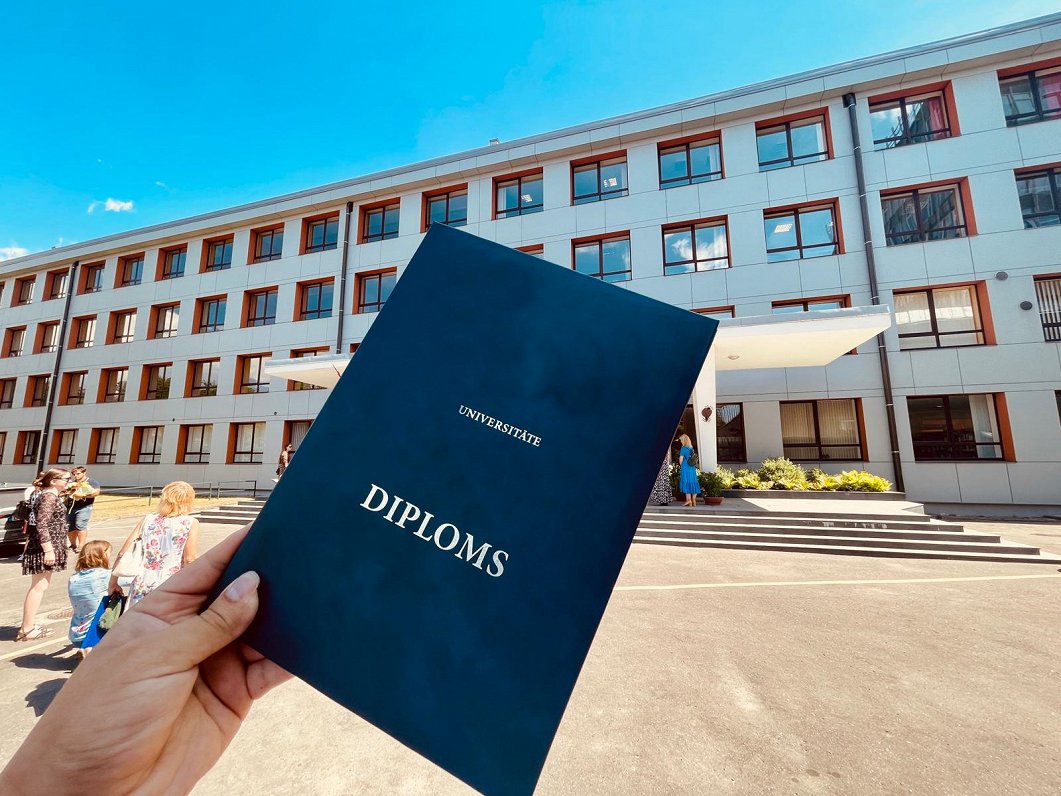The dissertation writing business has become so lucrative that companies are even being set up to enable the trade. The pandemic has created additional profit opportunities for academic ghostwriters, as students say they unable to complete university assignments on time due to the psychological stress caused by the Covid-19 pandemic.
"I think I paid about 500 euros. The bachelor's thesis was sorted. I was not caught and the diploma is in my pocket," admits Līga (not her real name) to Latvian Radio's reporter.
"When I was looking for a private tutor, I came across advertisements, in fact, a lot of advertisements, offering to write [assignments] and do work. I was tempted," she admits. It started with 30 euros for a homework assignment. But that was not the end of it. As the study work became more and more difficult, she opened her wallet more and more often.
She doesn't really know how much she's spent together, but it's a four-digit sum.
"There are so-called companies and there were also private individuals, so I found my own writer for each subject. There were even those who wrote online tests and exams that had to be taken on that day and time. I just arranged it all - people wrote them for me," Līga admits.
It is perhaps surprising that officially registered companies carry out such practices. The service providers were surprisingly honest - if the client was not satisfied with the result, she sent the works back for the authors to correct, and it was done.
"On the other side of the screen is the person to whom all the information is given, and with a little cooperation with him, everything was written," says Līga. Due to lack of time, she entrusted most of her work to proxies, including her bachelor's thesis. She admits that she was not really satisfied with the work, and had to fix it, but the end result got her a good passing grade.
"The bachelor's thesis was defended, of course, by myself. I was not caught out, and the diploma is in my pocket," Līga says.
There is no shortage of tempting ads on websites that offer to write papers for students. For example, "Entrust us with your task on any topic you need and forget about the stress of writing and missed deadlines!" Others stress that hiring a proxy writer can save time, stress and money, while a third assuages feelings of guilt by saying not everyone can be a specialist in everything.
One firm, "Absolvents.lv" describes itself as a study assistant. This "assistant" writes a variety of works, from essays and reports to course and diploma papers. They say of themselves: "We have been operating in this market for more than 5 years. We help to develop works not only for students of Baltic universities, but also abroad." "Absolvents.lv" is proud to have more than 1,700 written works in its account, though it stresses these are to be thought of as study aids.
Latvian Radio estimated that typically course work, which can be developed in about a week, costs from 100 euros. A diploma thesis, bachelor's thesis or other qualification thesis is at least three times more expensive - starting from 300 euros. It is possible to order a job in medicine, pedagogy, law and many other fields of study.
In turn, a master's thesis is put together over a longer period - starting from three weeks. Its price is not less than 500 euros. The price for each work is determined individually, depending on the number of pages, the complexity of the topic, the development time and additional requirements. When a job request is received, a company's manager selects one of its authors to handle the job.
According to Līga, the buyer of the bachelor's thesis, communication with the writers of the bachelor's thesis is anonymous, but she suspects that the company she used employs students and teachers who want to make money on the side.
She also made use of the website "entropy.lv" which specilaizes in science and technical subjects.
It can be read in the "Lursoft" database that the stated commercial activity of SIA "Entropy" is consulting on computer application issues. However, the company states on its website that it does student work, including online. Tasks are performed with an average score of 7 points. And the price - 40 euros for an hour and a half of work. Last year, the company had two employees and a profit of more than 26 thousand euros. In 2020 it earned much less - less than 5,500 euros, suggesting the pandemic may have caused a boom in demand.
Latvian Radio approached several public and private universities, which confirmed that they knew some students made use of such services. Some universities have even given examples of students confessing while defending their dissertations. However, there are few such cases. The problem is not new, though the pandemic could intensify it, says Professor Anika Miltuze, Vice-Dean of the Faculty of Pedagogy, Psychology and Art of the University of Latvia.
"There have been cases where students have teased their own classmates, saying "Well, you're a fool, you don't sleep day and night [because of study], but I pay a certain amount and I'm done." This information has also reached the ears of lecturers. And in that case, special attention is paid to such students," says Miltuze.
Professor Lūcija Rutka, Head of the Business Department of the School of Business, Arts and Technology "RISEBA", admits that the problem exists, but is doubtful that the pandemic has had a major effect on it.
"During the constraints of Covid-19, when students work remotely and we see them less, we have noticed that after the first defenses, their quality has even improved. Maybe because students have more time to work on research," suggests Rutka.
When asked by Latvijas Radio whether it might not suggest that the work might have been done by someone else instead, Rutka answered: "If there are thirty or forty people in the group, then it would be unlikely that these thirty people all have thirty or forty more people doing something for them."






















